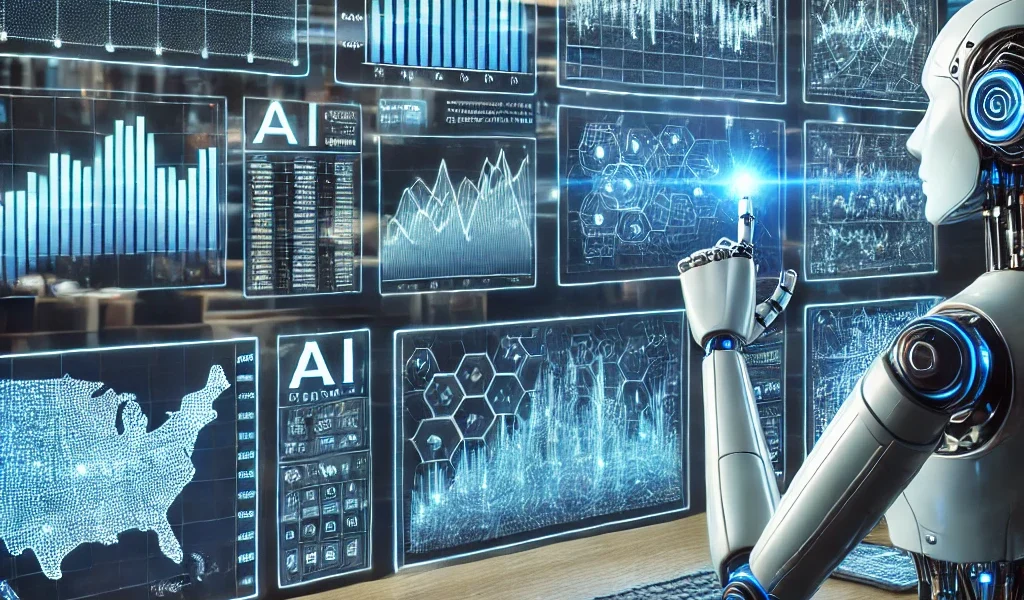The stock market has always been a dynamic and unpredictable space. Investors and traders constantly seek new ways to gain an edge over the market. With the rise of Artificial Intelligence (AI) and Machine Learning (ML), stock market predictions have entered a new era. These technologies are revolutionizing how traders analyze data, make decisions, and manage risks.
In this blog, we will explore how AI and ML are transforming stock market predictions, their benefits, challenges, and the future of AI-driven trading.
1. Understanding AI and Machine Learning in Stock Market Predictions
What is Artificial Intelligence (AI)?
Artificial Intelligence refers to computer systems that can perform tasks that typically require human intelligence. This includes learning from data, recognizing patterns, making decisions, and adapting over time.
What is Machine Learning (ML)?
Machine Learning is a subset of AI that enables computers to learn from past data and make predictions without being explicitly programmed. It uses complex algorithms to analyze large datasets and identify trends.
How AI & ML Are Used in Stock Market Predictions
- Analyzing market trends: AI studies past stock market patterns to predict future trends.
- Sentiment analysis: AI analyzes news, social media, and financial reports to understand market sentiment.
- Algorithmic trading: AI-powered trading bots execute trades at lightning speed.
- Risk management: AI helps traders minimize risks by analyzing volatility and potential market fluctuations.
2. Key Ways AI and ML Are Transforming Stock Market Predictions
A. AI-Powered Data Analysis for Accurate Predictions
Traditional traders rely on historical price charts, technical indicators, and economic reports. However, AI can analyze massive amounts of financial data in real-time and extract valuable insights.
✅ Example: Hedge funds use AI-driven analytics to detect small price movements before they become trends.
B. High-Frequency Trading (HFT) with AI
High-Frequency Trading (HFT) uses AI algorithms to execute thousands of trades per second. These algorithms take advantage of tiny price discrepancies to generate profits.
✅ Example: Financial firms like Citadel Securities and Virtu Financial use AI for HFT to execute rapid trades with minimal risk.
C. AI-Based Sentiment Analysis for Market Trends
AI scans financial news, analyst reports, and social media to gauge public sentiment about specific stocks or sectors.
✅ Example: If AI detects positive sentiment about Tesla due to strong earnings reports, it might predict a stock price increase.
D. AI in Portfolio Management and Risk Assessment
AI-powered robo-advisors help investors manage their portfolios by automating asset allocation and risk management. These robo-advisors analyze historical data and suggest investments based on a user’s risk tolerance.
✅ Example: Platforms like Wealthfront and Betterment use AI to manage diversified investment portfolios.
E. AI-Powered Stock Price Prediction Models
ML models analyze past stock movements and external factors like macroeconomic indicators, geopolitical events, and interest rates to make stock price predictions.
✅ Example: AI models like Long Short-Term Memory (LSTM) and Recurrent Neural Networks (RNNs) are used to predict stock price fluctuations.
3. Benefits of AI and ML in Stock Market Predictions
✅ Faster Decision Making: AI processes huge amounts of data in milliseconds, enabling quicker investment decisions.
✅ Improved Accuracy: ML models constantly learn from new data, improving their prediction accuracy.
✅ Eliminates Emotional Bias: Human traders often make emotional decisions, while AI relies solely on data and logic.
✅ Reduces Market Volatility: AI-powered trading strategies help stabilize market fluctuations by reducing human error.
✅ 24/7 Market Monitoring: AI continuously monitors the market, even when human traders are unavailable.
4. Challenges and Risks of AI in Stock Market Predictions
🚨 Data Limitations: AI models rely on historical data, but stock markets can be impacted by unexpected events like political instability or economic crises.
🚨 Algorithmic Failures: AI trading algorithms can malfunction, leading to massive losses if not properly monitored.
🚨 Regulatory Issues: Governments are still developing regulations for AI-driven trading to prevent market manipulation.
🚨 Ethical Concerns: AI could potentially favor high-frequency traders over retail investors, creating an uneven playing field.
🚨 Cybersecurity Risks: AI trading systems are vulnerable to hacking, which can disrupt financial markets.
5. The Future of AI in Stock Market Predictions
The future of AI in stock market predictions looks promising yet complex. Here are some expected trends:
📈 AI-powered personal finance advisors: AI will assist retail investors with personalized trading insights.
📈 Hybrid AI-human trading models: While AI will dominate analytics, human oversight will still be essential for strategic decision-making.
📈 Quantum Computing in Trading: The use of quantum computers will further enhance AI’s ability to process vast financial data.
📈 Stronger Regulations for AI Trading: Governments will introduce stricter rules to ensure ethical AI trading practices.
📈 Increased Use of Explainable AI (XAI): AI models will become more transparent, allowing traders to understand how predictions are made.
6. How to Use AI for Smarter Stock Market Investments
If you’re an investor looking to use AI for smarter trading, here are some tips:
✅ Use AI-powered trading platforms: Consider using AI-based tools like Trade Ideas, Tickeron, or Kavout to analyze stock trends.
✅ Stay informed about AI regulations: Keep track of AI-related financial regulations to avoid legal risks.
✅ Combine AI with traditional analysis: While AI is powerful, human judgment is still valuable in interpreting market movements.
✅ Be cautious with AI-driven predictions: No AI model can guarantee 100% accuracy. Always diversify your investments.
Final Thoughts: The Game-Changer in Stock Market Predictions
AI and Machine Learning have transformed stock market predictions, offering unparalleled speed, accuracy, and efficiency. While these technologies present challenges, their benefits far outweigh the risks. The future of AI-driven investing looks promising, but investors must remain informed, cautious, and adaptable.
By leveraging AI wisely and combining it with traditional investment strategies, traders can make smarter, data-driven decisions and gain a competitive edge in the stock market.
🚀 Are you ready to explore AI-powered investing? Start by researching AI-based tools and stay ahead in this rapidly evolving financial landscape!
Key Takeaways
🔹 AI enhances stock market predictions with real-time data analysis and sentiment tracking.
🔹 AI-powered High-Frequency Trading (HFT) is revolutionizing the speed of stock trading.
🔹 Machine Learning algorithms reduce human bias in investment decisions.
🔹 AI can improve accuracy but also poses risks like cybersecurity threats and regulatory concerns.
🔹 The future of AI in trading includes quantum computing, explainable AI, and hybrid AI-human models.




